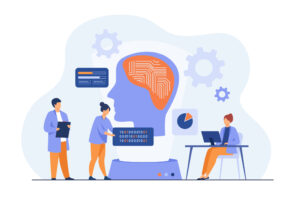Table of Contents
In today’s fast-paced business landscape, the integration of AI has evolved from a mere buzzword to a critical strategic imperative for companies across industries. From driving operational efficiency and data-driven decision-making to enhancing the customer experience and fostering innovation, AI provides many benefits essential for staying competitive and thriving in today’s digital economy. But before you go head first, you must know what the things to do before adopting AI in your business.

By embracing AI, such as Salesforce’s Einstein, which we will explore at the end of the article, companies can unlock new opportunities, drive growth, and shape the future of their industries. In summary, we can say that AI is a must-have in your marketing toolkit. However, Integrating AI into a business requires careful planning and preparation to ensure a smooth and successful implementation. We will now get into the top eight things to do before adopting AI into your business.
01
of 10
Understand Your Business Needs and Goals
When considering adopting AI in your business, the first thing to do is to understand the business needs, as this lays the foundation for the successful integration and utilization of artificial intelligence technologies. By comprehensively assessing the organisation’s challenges, opportunities, and goals, businesses can ensure that AI initiatives are strategically aligned with overarching objectives.
This alignment facilitates targeted investments in AI solutions, focusing resources on areas where they can deliver the most value and impact. Moreover, understanding business needs enables the customization and tailoring of AI applications to fit the organization’s specific requirements and processes, enhancing their relevance and effectiveness.
Furthermore, it allows businesses to anticipate and mitigate potential risks associated with AI adoption, such as data privacy concerns or stakeholder resistance. A deep understanding of business needs ultimately empowers organizations to develop scalable, sustainable, and impactful AI strategies that drive innovation, efficiency, and competitive advantage.
02
of 10
Familiarize Yourself with the Technology
Familiarizing yourself with the technology before adopting AI is essential for ensuring a smooth and successful integration process. By understanding AI technologies’ capabilities, limitations, and functionalities, you can make informed decisions about which solutions are best suited to address your business needs. Moreover, familiarity with the technology enables you to effectively communicate with stakeholders, including IT teams, developers, and vendors, facilitating collaboration and alignment of objectives. Additionally, it allows you to anticipate potential challenges or obstacles that may arise during implementation and develop strategies to mitigate them proactively.
03
of 10
Consider Training and Support
Evaluating the training and support needed by your team before adopting AI ensures a successful implementation and maximizes the benefits of artificial intelligence technologies within an organization.
Adequate training equips employees with the knowledge and skills needed to effectively utilize AI tools and platforms, reducing the learning curve and increasing productivity. Additionally, it fosters a culture of innovation and continuous learning, empowering employees to leverage AI capabilities to solve complex problems and drive business growth. Moreover, providing comprehensive support services ensures that users have access to assistance and guidance when encountering challenges or seeking optimization opportunities. This proactive approach not only enhances user satisfaction but also minimizes disruptions to operations and accelerates the adoption of AI across the organization. Overall, considering training and support before adopting AI is essential for enabling organizations to harness the full potential of AI technologies and realize their strategic objectives.
04
of 10
Assess Data Availability and Quality
To access data availability and quality before adopting AI forms the foundation upon which AI algorithms operate. Understanding the availability of relevant data ensures that there is an adequate volume of information for training AI models effectively.
Moreover, assessing the quality of data, including its accuracy, completeness, and consistency, is crucial for ensuring the reliability and validity of AI-driven insights and predictions. High-quality data minimizes the risk of biased or inaccurate outcomes, which can undermine the trust and effectiveness of AI systems.
Additionally, evaluating data availability and quality allows organizations to identify potential gaps or deficiencies in their data infrastructure and take steps to address them, such as data cleansing, augmentation, or acquisition. Ultimately, by prioritizing data availability and quality assessment, organizations can lay a solid groundwork for successful AI adoption and maximize the value derived from AI-driven decision-making and automation.
Get to know more about analyzing your data quality in this Stellaxius’ article.
05
of 10
Understand Legal and Ethical Implications and Prioritize Security Measures
Assessing legal and ethical considerations helps organizations navigate regulatory frameworks, such as data privacy laws and industry standards, to ensure compliance and mitigate potential legal liability risks. It also promotes ethical AI practices, such as fairness, transparency, and accountability, critical for building trust with customers, stakeholders, and the broader community.
Prioritizing robust security measures safeguards sensitive data and AI algorithms from unauthorized access, breaches, or misuse, ensuring compliance with industry standards and regulations and protecting both the organization and its stakeholders.
By addressing legal, ethical, and security concerns upfront, organizations can foster a culture of responsible AI adoption, mitigate risks, and build a foundation for sustainable and trustworthy AI-driven innovation.
06
of 10
Assess Technical Infrastructure
To understand if the organization has the necessary capabilities and resources to support AI initiatives effectively is a key point before implementing artificial intelligence in business.
Understanding the current state of technical infrastructure helps identify any gaps or limitations that may hinder the successful implementation of AI technologies, such as insufficient computational power, storage capacity, or network bandwidth. By evaluating technical infrastructure upfront, organizations can proactively address any deficiencies and make necessary upgrades or investments to support AI workloads and applications.
Moreover, assessing technical infrastructure enables organizations to align AI initiatives with existing IT systems and architecture, ensuring compatibility, integration, and scalability.
Ultimately, by prioritizing the assessment of technical infrastructure, organizations can lay a solid foundation for the successful adoption and deployment of AI technologies, maximizing their potential to drive innovation, efficiency, and competitive advantage.
07
of 10
Start with Pilot Projects
Consider starting with small-scale pilot projects that enable organizations to assess the effectiveness and impact of AI solutions on a smaller scale, reducing the risks associated with large-scale deployments, optimizing outcomes, and laying a solid foundation for scalable and sustainable AI-driven innovation.
By starting small, organizations can identify and address potential challenges, such as data quality issues, technical constraints, or resistance from stakeholders, early in the process. Moreover, pilot projects provide valuable insights and lessons learned that can inform the development of best practices, implementation strategies, and roadmaps for future AI initiatives.
Additionally, successful pilot projects build confidence and buy-in from stakeholders, paving the way for broader acceptance and adoption of AI technologies within the organization.
08
of 10
Establish Performance Metrics
Establishing performance metrics is crucial for monitoring and evaluating the success of AI initiatives. By defining clear and measurable goals, organizations can track progress, identify areas for improvement, and ensure that AI projects deliver the expected value and impact. Consider including metrics such as ROI, efficiency gains, customer satisfaction, innovation outcomes, and prediction accuracy.
Start by identifying specific objectives for AI adoption, such as enhancing operational efficiency, boosting customer engagement, or driving revenue growth. For each objective, set measurable targets that can be tracked over time. Establish baseline measurements before implementing AI solutions to provide a point of comparison for assessing the impact of AI initiatives.
Implement regular review processes to monitor these metrics and evaluate performance. Use data analytics tools to generate insights and visualize progress. Finally, be prepared to iterate on your AI strategies based on performance data, as continuous improvement is key to maximizing the benefits of AI.
09
of 10
Now that you know the things to do before adopting AI get to know Salesforce Einstein AI!
As an example of an efficient AI solution, Einstein AI was launched in 2016 by Salesforce, and is meant to simplify your business as it offers a set of services that couple AI capabilities into all Salesforce Clouds, making it the smartest CRM platform in the world.

Built into the Salesforce Platform, Einstein uses powerful machine learning and large language models to personalize customer interactions and make employees more productive. Einstein really was created to explore data at scale and get actionable insights for your sales, marketing, or service teams.
When it comes to Salesforce Marketing Cloud, there are some AI-powered features you might enjoy trying as sooner as possible:
- Einstein Engagement Scoring: seaking of e-mail marketing campaigns, with this feature you can get to know your audience better by scoring their actions, monitoring and then segmenting. AI will create audiences and target specific segments, while it can personalise content based on the provided score.
- Einstein Send Time Optimization: with the help of our Einstein genius, this feature helps you determine when emails should be sent based on past engagement data. With this feature, you can optimize the time the email is sent, increasing your engagement rates.
- Einstein Engagement Frequency: have you ever felt like maybe you are sending too many or too few emails? If that has ever happened to you, now is the time to use AI to your advantage. This feature scans individual customer engagement behaviours to predict the optimal send frequency for marketing emails.
Get to know more about how Stellaxius uses Salesforce Einstein AI in the following article: A sneak peek into Salesforce Einstein.
10
of 10
Preparing for Salesforce Einstein AI with Stellaxius
Now that you know the things to do before adopting AI, you should know that at Stellaxius, we prepare you for Salesforce Einstein using a pragmatic approach. We focus on delivering professional solutions aligned with client objectives.
Here’s an insight into our methodology for preparing data for Einstein AI:
- We’ll show you why it’s important to be practical in data preparation. Instead of striving for perfection, the focus is on making necessary adjustments to ensure the data serves its purpose effectively.
- When preparing data for Salesforce Einstein AI, you must acknowledge the unpredictability of real-world scenarios.
- Clear communication with our clients is important. It ensures that expectations are set realistically and that any limitations or challenges are communicated openly.
If you’re ready to take the next step, don’t hesitate to contact us and start your AI journey with us. Subscribe to our Knowledge Center to keep yourself updated on the newest articles.






